Regardless of whether these types of homes are registered in the land registry or not, paying taxes such as property tax, garbage collection, etc., does not mean they are legal.
To legalize a home that does not meet the minimum legalization requirements on non-urbanizable land in order to carry out a legalization project and final work certificate (minimum plot area, heights, etc.) there are three scenarios, that were built before May 25, 1975, homes built between May 25, 1975 and August 20, 2014 and finally homes built after August 20, 2014. (for more information on how to legalize this type of housing click here)
Now, why would I want to legalize my home if I pay taxes, it's registered in the land registry, and it was built many years ago?
This is a question that arises for every homeowner whose home was built without a permit on undeveloped land. To address this, let's list the benefits of a completely legal home:
- Contract the different supplies of water, electricity, sanitation, etc.
- Carry out rehabilitation works.
- To be able to legally sell or rent it.
- Mortgage or guarantee the home.
- Have a home with all the legal documentation.
- The peace of mind that comes from having a property that, for the purposes of the administration, complies with current legislation and that they cannot initiate any measures to restore legality (these measures include, among others, cessation of water, electricity, gas and telephone services, blocking of access, demolition orders, etc.)
I already have water and electricity supplies, so I don't need to mortgage or renovate it. Is it advisable to legalize it?
To answer this question, two factors must be analyzed: what I am violating by building without a permit, and the timeframe established by law for the administration to act on the planning violation.
We assume that building on undeveloped land without a permit is a planning violation, which can be prosecuted by the municipal council ex officio (motu proprio) or by a party (a neighbor who wishes to file a complaint). The penalties range from coercive fines to the demolition of the building, depending on the type of planning violation committed.
Finally, it should be emphasized that the administration has 15 years to impose sanctions once the works have been completed, according to Article 236 of Law 5/2014, of July 25, of the Generalitat, on Territorial Planning, Urbanism and Landscape, of the Valencian Community.https://www.boe.es/eli/es-vc/l/2014/07/25/5/con)



